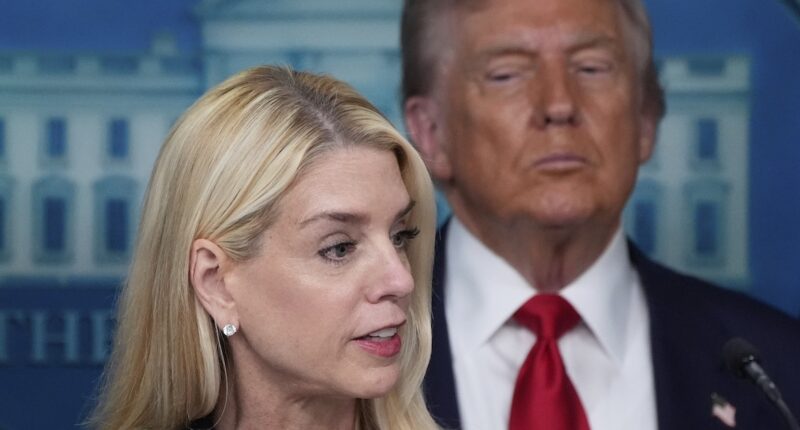Share this @internewscast.com
Attorney General Pam Bondi speaks with reporters in the James Brady Press Briefing Room at the White House, Monday, Aug. 11, 2025, in Washington, as President Donald Trump looks on (AP Photo/Alex Brandon).
A federal judge has dismissed a lawsuit filed by the Trump administration against New York state regarding its stance on immigration collaboration. The judge determined that New York has the right to implement and uphold a law that prevents arrests in courthouses, emphasizing this as a state responsibility.
In a detailed 41-page decision released on Monday, U.S. District Judge Mae D’Agostino asserted that New York should not be stripped of “its essential ability to protect its sovereign interests” from excessive federal intervention.
The lawsuit, initiated on June 12 by the Trump administration, targeted New York Governor Kathy Hochul and Attorney General Letitia James over specific elements of the state’s Protect Our Courts Act (POCA). This 2020 legislation aims to ensure that all community members can access the justice system without fearing immigration-related repercussions. The legal challenge also included two executive orders from 2018, signed by then-Governor Andrew Cuomo, which restricted New York law enforcement from adhering to federal immigration mandates.
These policies were introduced during Trump’s first term, when civil immigration arrests at state courthouses surged by around 1,200% over his initial three years in office, as D’Agostino noted. The federal-state clash persisted as attempts to arrest suspected illegal immigrants at state courthouses continued after Trump was reelected in January.
The central issue was whether federal laws should override the state’s legislation and orders. The Justice Department contended that they should, further accusing New York of unlawfully discriminating against the federal government.
However, D’Agostino dismissed these assertions.
“The Court agrees with Defendants that the United States’ preemption challenges to these Executive Orders fail because neither executive order conflicts with federal law,” the Barack Obama appointee wrote. She continued, at length:
“Fundamentally, the United States fails to identify any federal law mandating that state and local officials generally assist or cooperate with federal immigration enforcement efforts. Nor could it. No such federal laws exist because the Tenth Amendment prohibits Congress from conscripting state and local officials and resources to assist with federal regulatory schemes, like immigration enforcement. It may be, as the United States contends, that Congress had “the expectation of collaboration” between federal, state, and local authorities when it enacted the federal immigration laws. But a hope, however fervent, that federal-state cooperation will occur does not empower the federal government to conscript the States.”
As part of its discrimination claims, the Trump administration argued that New York had violated the intergovernmental immunity doctrine, a legal principle meant to ensure that state laws could not regulate or discriminate against the federal government. In her conclusion, D’Agostino ruled that just because the Trump administration wants New York to cooperate does not mean its desires hold more weight than the state’s.
“Where, as here, the Tenth Amendment permits a state to decline to assist with federal immigration efforts, that state’s determination that its interests are best served by not permitting its resources to be conscripted for federal immigration enforcement cannot be invalidated merely by recasting that otherwise permissible choice under the intergovernmental immunity lens,” she wrote. “To hold to the contrary would improperly elevate the concerns of the federal sovereign over that of a State and deprive New York of its essential ability to protect its sovereign interests in the face of undue federal interference.”
James celebrated the court’s decision on Tuesday, saying, “Everyone deserves to seek justice without fear.”
“This ruling ensures that anyone can use New York’s state courts without being targeted by federal authorities,” she continued. “My office will continue fighting to defend the dignity and rights of immigrant communities throughout New York.”















